تتناقل فرق العمل مصطلح "مخرجات المشروع" مثل الحلوى في الاستعراضات هذه الأيام. يصعب أحياناً تحديد ما يقصده العميل أو أعضاء الفريق الداخلي عندما يستخدمون هذا المصطلح.
ويصبح الأمر أكثر صعوبة في الحصول على نفس الصفحة إذا لم يكن لديك عملية محددة بوضوح لتحديد وإدارة مخرجات المشروع. يقول معهد إدارة المشاريع إنه بدون إدارة استراتيجية للمشروع، فإن معهد إدارة المشاريع يقول 67% من المشاريع تفشل أكثر من غيرها بشكل مباشر
لا عجب أن يشعر مدير مشروعك على الأرجح بالغثيان كلما أضاف شخص ما إنجازًا آخر إلى مشروع سيء التخطيط بالفعل.
لا تخف! نحن هنا لمساعدتك!
سنساعدك على اكتشاف كيفية تقديم القيمة لعملائك باستمرار، وتحديد أولويات المهام لإدارة النطاق، و تبسيط توزيع الموارد .
يفصل هذا الدليل كيفية مواءمة الفرق الداخلية والخارجية في تسليم المشاريع بحيث تحافظ على رضا العملاء، وفرق العمل أكثر كفاءة، وهوامش الربح في المنطقة الخضراء.
ما هي مخرجات المشروع؟
نواتج المشروع هي المهام الفردية التي تفي بـ النطاق الكلي للمشروع وتساهم في تحقيق أهداف المشروع .
مثلما لم تُبنى روما في يوم واحد، لا يمكنك إكمال المشاريع دون المساهمة في المدخلات. هذه هي مخرجات المشروع؛ وهي اللبنات الأساسية في خطة المشروع .
أنواع مخرجات المشروع
يتم تحديد أنواع المخرجات حسب الوظيفة والفريق المسؤول عن تسليمها. على سبيل المثال:
داخلي مقابل خارجي

تجميع المهام في لوحة كانبان حسب الحالة والحقول المخصصة والأولوية والمزيد في طريقة عرض لوحة ClickUp
التسليمات ليست فقط للعملاء. فهي تعمل أيضًا كوسيلة لمساعدة فرقك الداخلية على البقاء على المسار الصحيح.
على سبيل المثال، قد تكون التسليمات الداخلية عبارة عن مسودة مدونة يرسلها كاتب المحتوى إلى فريق التحرير لديك. قد يكون التسليم الخارجي هو مسودة المدونة النهائية التي يقدمها كاتب المحتوى إلى العميل.
العملية مقابل المنتج
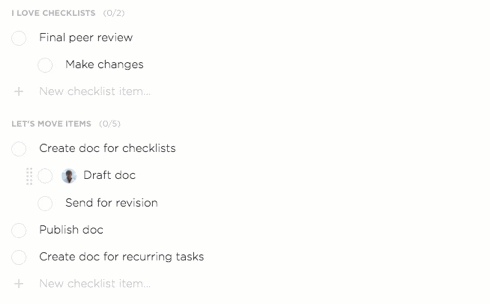
أعد تنظيم قائمة تدقيق ClickUp الخاصة بك عن طريق سحب العناصر وإفلاتها
نواتج العملية هي مهام إجرائية تساعد في دفع المشروع إلى الأمام (على سبيل المثال، قائمة تدقيق العلامة التجارية). من ناحية أخرى، المخرجات المنتج تفي بتفاصيل الخدمات الموضحة في نطاق المشروع (على سبيل المثال، دليل العلامات التجارية المكتمل).
كبير مقابل صغير
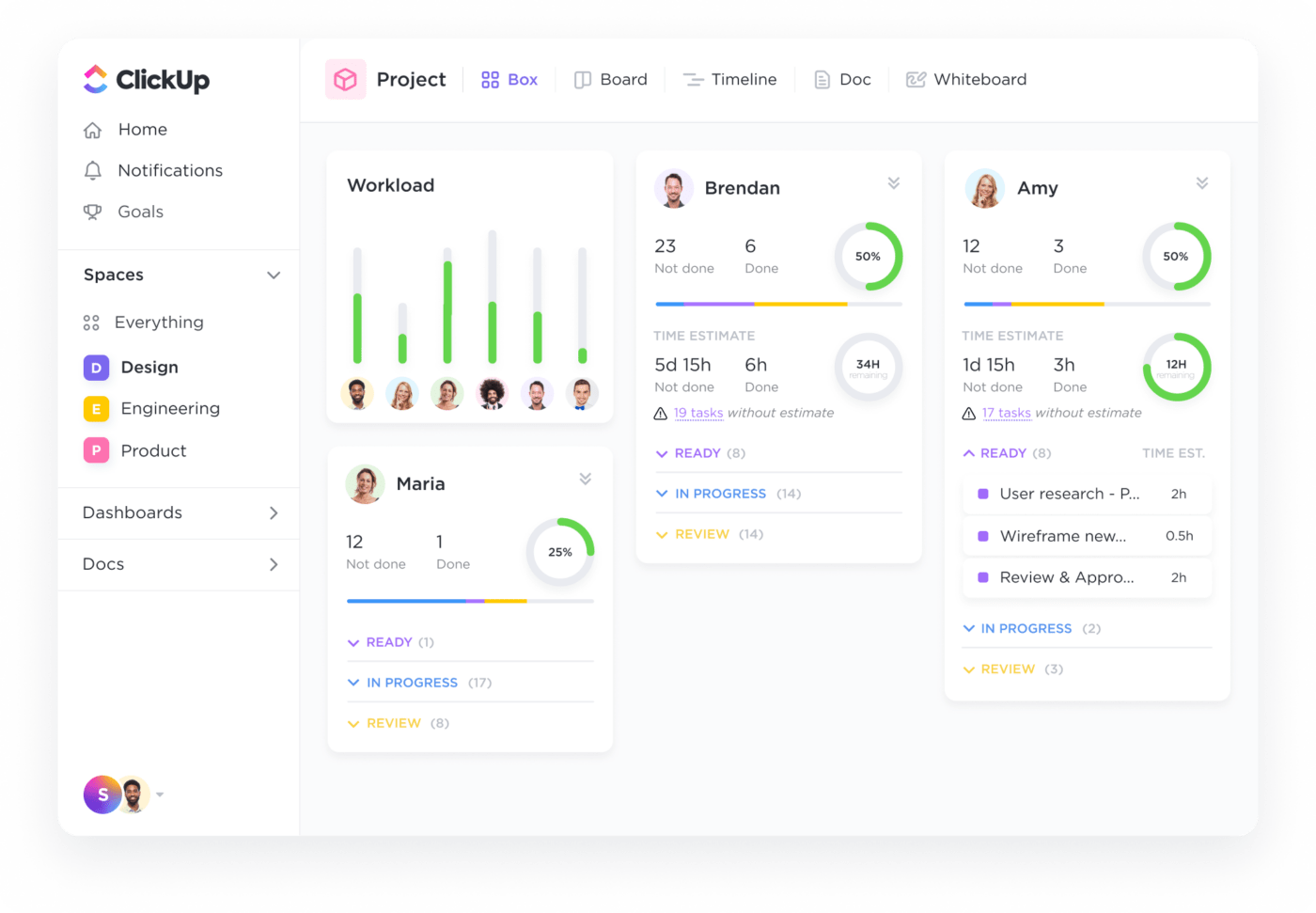
توفر طريقة عرض عبء العمل ClickUp Workload View رؤى حول مقاييس مشروعك لتكون متقدمًا بخطوة إلى الأمام
من المهم تقسيم النواتج وفقًا لحجمها أو تأثيرها على تقدم المشروع حتى تتمكن من تقدير أعباء العمل بدقة وتحديد الأولويات تخصيص الموارد . على سبيل المثال، إنجاز كبير لـ مشروع تطوير الموقع الإلكتروني سيتم الانتهاء من قاعدة بيانات كتالوج المنتجات
من ناحية أخرى، قد يكون الإنجاز الصغير هو إنشاء القوالب لصفحات المنتجات الفردية.
الملموسة مقابل غير الملموسة

يمكن أن يكون تأهيل فريقك على منصة جديدة مثل ClickUp مشروعًا غير ملموس لإنجازه
بعض عناصر المشروع لا تتطلب تسليمًا ماديًا. ومع ذلك، لا تزال هذه الموارد ضرورية لنجاح المشروع. وهذا يشير إلى نواتج المشروع غير الملموسة.
على سبيل المثال، نقل المعرفة في شكل تأهيل العميل وبرنامج التدريب أمر حيوي لنجاح المشروع. ومع ذلك، قد لا يتضمن تسليم المستندات المادية.
النواتج الملموسة هي أجزاء من المشروع لها شكل ومضمون. على سبيل المثال، قد يكون التسليم الملموس هو دليل التدريب.
أمثلة على مخرجات المشروع للفرق المختلفة
ستختلف مخرجات المشروع باختلاف فريقك. ولإعطائك فكرة أفضل عن مخرجات المشروع إليك أربعة أمثلة على مخرجات المشروع لفرق العمل:
فرق التسويق:
- تقويم محتوى وسائل التواصل الاجتماعي
- حملة تسويق عبر البريد الإلكتروني
- إرشادات رسائل العلامة التجارية
فرق التصميم:
- نماذج إعادة تصميم الموقع الإلكتروني
- تصميم الشعار
- تصميم عبوات المنتجات
فرق المنتجات:
- خارطة طريق المنتج
- قصص المستخدمين
- مواصفات الميزات
فرق الموارد البشرية:
- برنامج التأهيل للموظفين الجدد
- نتائج استبيان مشاركة الموظفين وخطة العمل
- كتيب ثقافة الشركة
ما هي مخرجات المشروع؟
في كل كيس من حلوى الاستعراض، من المحتمل أن يكون هناك على الأقل قطعتان من الحلوى التي تتنكر في شكل حلوى (انظر إليك، يا حلوى توتسي رولز). وبالمثل، يواجه الناس في بعض الأحيان صعوبة في التمييز بين مخرجات المشروع وأجزاء أخرى من المشروع، مثل:
- معالم المشروع : هذه هيمراحل المشروع ولكنها ليست نواتج فعلية. يمكن أن تساهم نواتج المشروع القابلة للتسليم في الوصول إلى مراحل المشروع الرئيسية. على سبيل المثال، قد يشير دليل العلامات التجارية (نواتج المشروع) إلى اكتمال "تطوير أصول العلامة التجارية" (معلم) في مشروع للعلامة التجارية والتسويق
- أهداف المشروع والأهداف: إنها تقيس الوجهة أو النتائج التي تريد الوصول إليها من خلال عمل فريقك. ومع ذلك، فهي ليست ما تستخدمه للوصول إلى هناك. قد يكون هدف المشروع هو زيادة العملاء المحتملين الواردين بنسبة 20%، في حين أن محتوى تحسين محركات البحث قد يكون أحد مخرجات المشروع الذي يساهم في نجاح مؤشر الأداء الرئيسي هذا
- المنتج النهائي: يتكون هذا من الأجزاء المساهمة (أي مخرجات المنتج) ولكنه ليس هو نفسه تلك الأجزاء الفردية. قد يكون المنتج النهائي تطبيقًا مطورًا بالكامل، لكن النواتج الرئيسية التي تساهم في هذا المنتج النهائي هي الإطارات السلكية لواجهة المستخدم وعناصر التصميم وغير ذلك الكثير
هذه الجوانب هي أجزاء مهمة من المشروع - لكنها ليست مخرجات المشروع.
كيف تختار مخرجات المشروع لفريقك
الآن بعد أن عرفت ما هي مؤهلات مخرجات مشروعك الداخلية والخارجية، قد تتساءل عن كيفية اختيار المخرجات لمشروع معين.
أولاً، لا يوجد عدد محدد من مخرجات المشروع؛ حيث يعتمد عدد المخرجات على متطلبات المشروع، و الجدول الزمني والميزانية والشروط المتفق عليها. ومع ذلك، يجب أن تخضع هذه العناصر لمشروعك التسلسل الهرمي (يُعرف أيضًا باسم هيكل تقسيم العمل أو WBS ) قبل الانتقال إلى تحديد مخرجات المشروع.
يمنحك التسلسل الهرمي الفريد من نوعه في ClickUp المرونة في تنظيم الفرق من أي حجم
سيساعد ذلك فريقك الداخلي في الحفاظ على استمرارية سير العمل عبر المشاريع.
لمعرفة مخرجات مشروع العميل الخاص بك, تقسيم المهمة إلى مهام صغيرة الحجم . ابدأ بسؤال نفسك عن أهداف المشروع وكيف يساهم منتجك في تحقيق تلك الأهداف.
ثم انظر ما هي الأهداف القابلة للتنفيذ مهام النقر فوق المهام يجب أن تحدث لتقديم هذا المنتج أو الخدمة وتحقيق هدف المشروع. هذه المهام القابلة للتنفيذ هي مخرجات مشروعك.

افهم أين تقف جميع أعمالك في لمحة سريعة من خلال تنظيم المهام بخيارات مرنة للفرز والتصفية والتجميع في طريقة عرض القائمة في ClickUp
لنفترض أن عميلاً أحضر فريقك من أجل إنستجرام حملة تسويقية . من خلال المحادثات مع العميل، توافق على ما يلي نطاق العمل سيشمل 10 منشورات ثابتة وبكرات للوصول إلى أهداف حملتهم.
بالنسبة لمؤلفي الإعلانات والمصممين ومنتجي الفيديو، سيكون هناك 10 صور ثابتة وتعليقات توضيحية ومقاطع فيديو. تمنحك هذه التقسيمات القابلة للتسليم في المشروع أنت وفريقك فكرة واضحة عن العمل الذي ينتظرك - مما يساعدك على تخصيص الموارد، والبقاء ضمن النطاق والميزانية، والتسليم في الوقت المحدد.
خطوات إدارة تسليمات المشروع ## خطوات إدارة تسليمات المشروع
إذا كنت قد عملت مع العملاء، فأنت تعلم أن المهام العشوائية تظهر طوال الوقت. في الواقع, دليل المتمردين لإدارة المشاريع وجد أن 59% من مديري المشاريع يقولون إنهم يديرون ما بين مشروعين وخمسة مشاريع في وقت واحد.
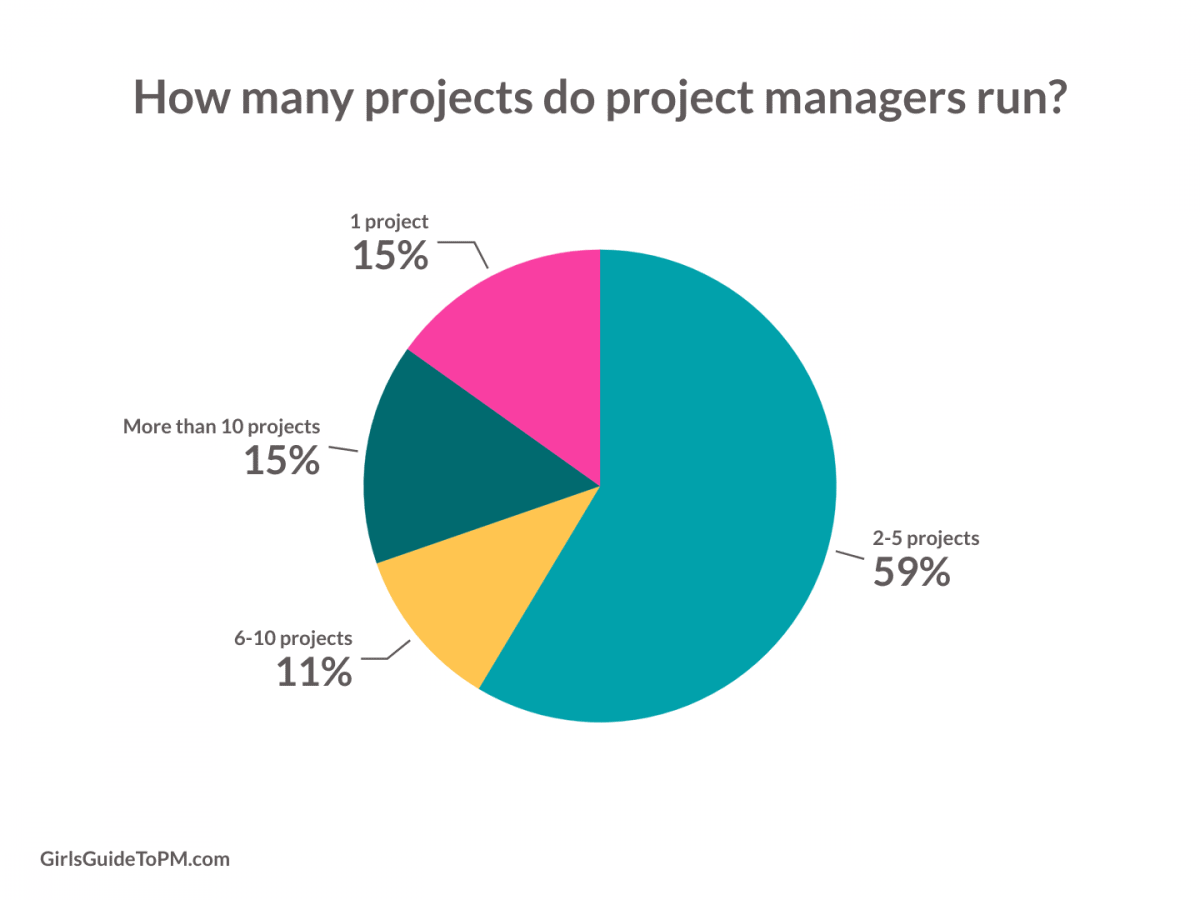
عبر RGPM
إذن، كيف تتعامل أنت أو مدير مشروعك مع مخرجات المشروع عند التعامل مع مشاريع متعددة للعملاء في وقت واحد؟ حدد أولويات واضحة وأصحاب المهام منذ البداية، و تفويض الأعمال المزدحمة إلى الذكاء الاصطناعي.
1. تحديد نطاق العمل والحصول على موافقة مكتوبة من جميع أصحاب المصلحة
لا تترك مشروعك للصدفة. ابدأ كل مشروع من خلال تحديد متطلباته مع العميل في اجتماعك الافتتاحي. حدد نوع المشروع لكل مهمة، وأولويتها، والساعات القابلة للاستخدام، والميزانية.
بمجرد تحديد مخرجات مشروعك، من الأهمية بمكان أن يكون من المهم للغاية أن يكون هناك أصحاب المصلحة في المشروع الموافقة عليها والتوقيع على اتفاقية عمل مكتوبة (المعروف أيضًا باسم ميثاق المشروع).

يتيح ClickUp Docs التنسيق المنسق و أوامر الشرطة المائلة للعمل بكفاءة أكبر
يوفر هذا المستند مصدرًا مركزيًا للحقيقة في حالة وجود أي خلافات على طول الطريق ويوحدك أنت وعميلك نحو هدف مشترك. إن ميثاق المشروع سيحدد التوقعات والتفويضات وتفويض المسؤوليات لأصحاب المصلحة الداخليين والخارجيين.
لا يعني توقيع اتفاقية لا يعني أن مشاريعك لا يمكن أن تتطور؛ فهو ببساطة يسمح لك بإعادة النظر في المشروع بيان نطاق العمل وحماية فريقك من العمل فوق طاقته وتقليل أجره.
2. تحديد النطاق الترددي للفريق وتوزيع العمل وفقًا لذلك
قم بتوزيع عبء العمل وفقًا لمهارات فريقك والنطاق الترددي الفردي. راقب ما تعمل عليه الفرق والأفراد، ومتطلبات كل مشروع قابل للتسليم، و أولويات الفريق لتوزيع المهام بالتساوي
القول أسهل من الفعل عندما تكون غارقاً في مشاريع متعددة! ولكن مع ClickUp إدارة عبء العمل عرض، الأمر سهل مثل فتح لوحة التحكم الخاصة بك.
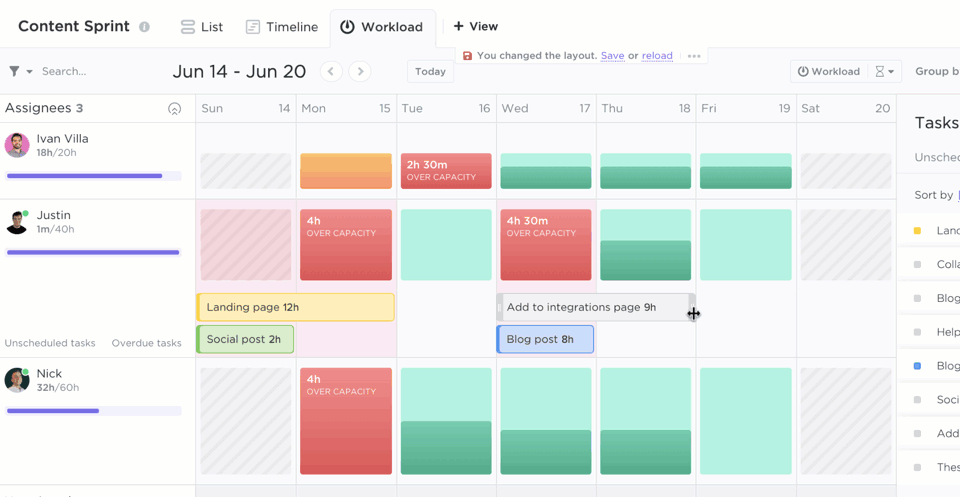
استخدم طريقة عرض عبء العمل في ClickUp لمعرفة من هو متقدم أو متأخر وسحب المهام وإفلاتها بسهولة لإعادة تخصيص الموارد ClickUp يجعل حياتك أسهل من خلال تتبع عبء العمل في مقاييس الإنتاج الخاصة بفريقك بدلاً من قياسات الإنتاجية العامة. يتميز عبء العمل في ClickUp القابل للتخصيص بالكامل بحقول مخصصة حتى تتمكن من تتبع عبء عمل الفريق بأي طريقة تناسب ديناميكية فريقك وعملية إنجازه.
قد تفضل بعض الفرق قياس عبء العمل في نقاط العدو السريع بينما قد يقيس آخرون عبء العمل بحجم المهمة أو تقديرات الوقت. باستخدام مركزية إدارة المشروع أداة أساسية لإدارة الفريق بكفاءة، بغض النظر عن كيفية قياس مؤسستك لعبء عمل الفريق.
على سبيل المثال, 93% من الموظفين في شركة STANLEY Security أن التحول إلى ClickUp ساعدهم على تنظيم عملهم وترتيب أولوياته بشكل أفضل. بالإضافة إلى ذلك، أفاد 72% من الموظفين بتخفيف عبء العمل الزائد والضغط النفسي.

3. أتمتة الأعمال المزدحمة لزيادة التركيز على الأنشطة المهمة
من السهل أن تتأثر جودة المشروع عندما تكون مشغولاً بالأعمال الإدارية للعميل واتصالات الفريق. الخبر السار هو أن الأتمتة يمكن أن تزيل هذا العمل المزدحم من على عاتقك.

استخدم وصفات الأتمتة المبنية مسبقًا أو خصصها بناءً على احتياجاتك، حتى يتمكن فريقك من التركيز على ما هو أكثر أهمية
في ClickUp، يمكن للفرق استخدام العلامات لإخطار الآخرين تلقائيًا عندما تكون النواتج الداخلية أو الخارجية جاهزة والحفاظ على أهداف المشروع للمضي قدمًا. تترك علامات الأتمتة أيضًا أثرًا واضحًا للتدقيق مع روابط مباشرة إلى التسليمات، مما يقلل من الحاجة إلى طلب تحديثات المشروع باستمرار.
تخبرنا الشركات التي تستخدم ClickUp أن لديها مساحة أكبر للتركيز على المهام عالية المستوى بفضل أداتنا. في الواقع، وجدت دراسة STANLEY Security نفسها أن 86% من الموظفين قضوا وقتًا أطول في التركيز على الأنشطة المهمة عالية المستوى بمساعدة أتمتة ClickUp، كما شهد 80% منهم تحسنًا في العمل الجماعي.
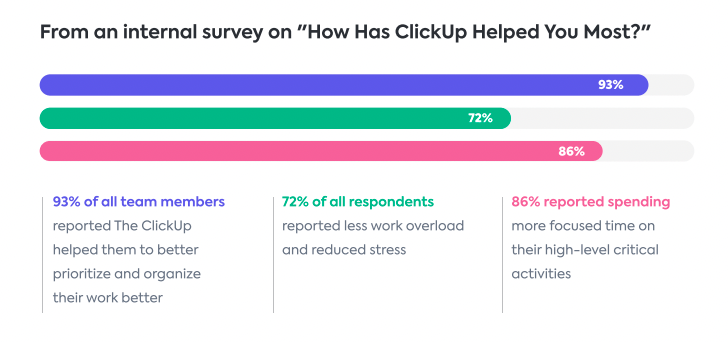
استطلعت شركة ستانلي سيكيوريتي آراء موظفيها الداخليين لفهم تأثير ClickUp
لا يقتصر تأثير الأتمتة على حكايات الموظفين أيضاً. فقد اكتشف تقرير من شركة ماكنزي ثلثا الشركات يرون فوائد متعددة مع تدفقات العمل المؤتمتة بما في ذلك - على سبيل المثال لا الحصر - تحسين جودة المنتج وخفض التكاليف وزيادة رضا العملاء.
4. التخفيف من مشاكل المشروع قبل أن تؤثر على مخرجات المشروع
يتوقع مدير المشروع الكفء المشاكل ويخفف من حدتها قبل أن تؤثر على نواتج المشروع. ولكن هذا النهج الاستباقي يكاد يكون مستحيلاً إذا لم تكن لديك الأدوات المناسبة.
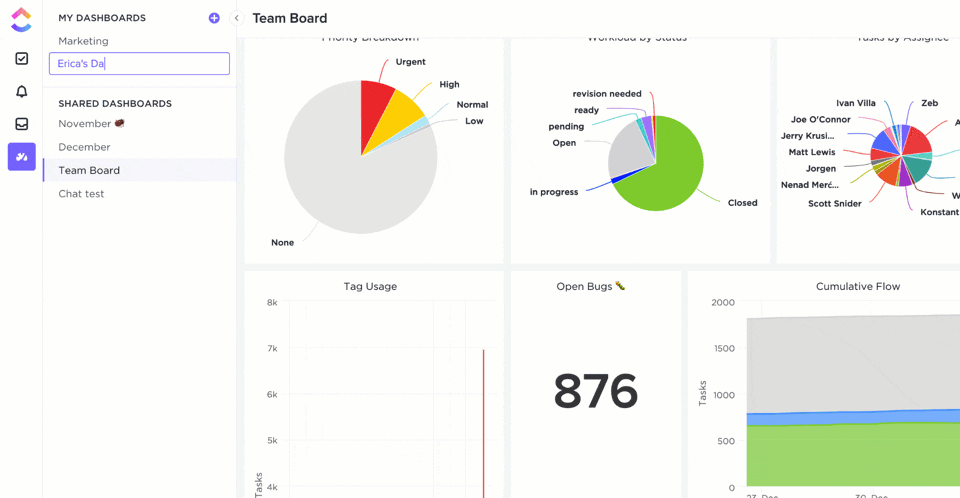
اسحب التقدم المحرز على الفور بناءً على المعالم والمهام والوقت والنشاط والمزيد.
يحل ClickUp هذه المشكلة من خلال توفير عرض شامل لحالة المشروع في الوقت الفعلي بنقرة واحدة. يمكن لمدير المشروع مراقبة التقدم المحرز في المشروع عن كثب عبر مقاييس متعددة للتخفيف من التأخير _قبل أن يفوت فريق العمل المعالم الرئيسية في الجدول الزمني للمشروع أو يتجاوز الميزانية.
عندما تتمكن من معرفة ما إذا كان المشروع يتجه في الاتجاه الخاطئ في لمحة واحدة، فإن ClickUp يجعل من السهل التدخل بوساطة خطة لنطاق المشروع قبل أن يخرج عن سيطرتك. في الواقع، يمكنك حتى التحقق من حالة المشاريع بناءً على الميزانية المتبقية والساعات المتبقية والحالة وغير ذلك الكثير.
7 قوالب لتسليم المشاريع لتبدأ بها
هل تريد إدارة جميع مهام مشروعك بشكل أسرع؟ لقد قمنا بتغطية نطاق مشروعك.
استخدم واحدًا (أو أكثر!) من قوالبنا السبعة الرئيسية لتسليمات المشروع الرئيسية لترى ClickUp قيد التنفيذ. هل تستخدم بالفعل منصة أخرى؟
لا بأس بذلك!
لقد جعلنا من السهل استيراد المشاريع والمهام في ClickUp، لذا انظر أي قالب أو قوالب تناسب احتياجاتك بشكل أفضل، وكن مستعدًا لعدم النظر إلى الوراء أبدًا!
1. قالب ClickUp لإدارة المشاريع ذات الميزانية المحدودة
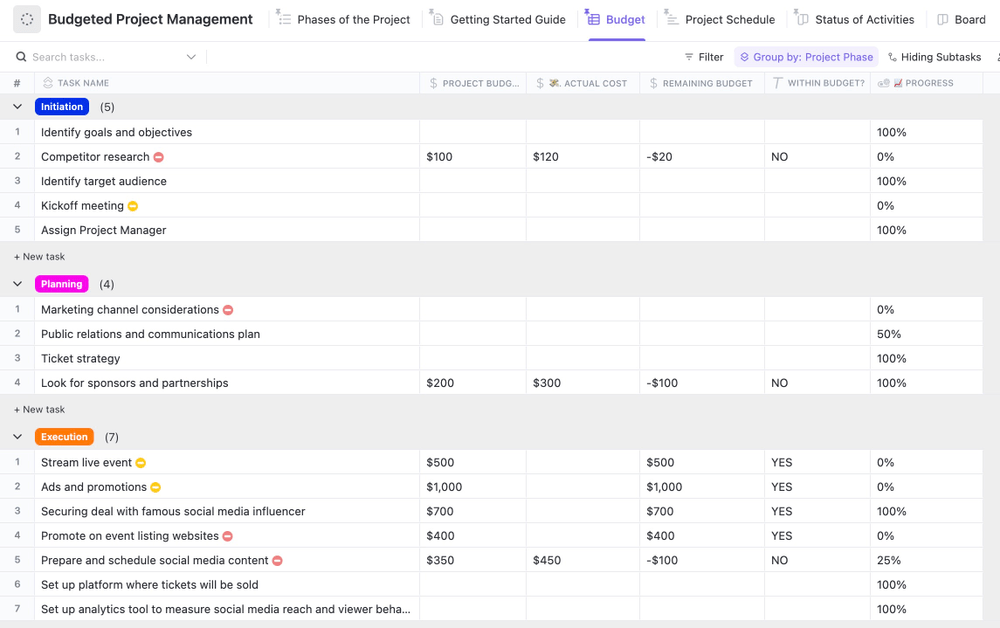
احصل على نظرة عامة عالية المستوى لميزانية مشروعك أثناء إدارة المهام والحالات في هذا القالب سهل الاستخدام
هل تحتاج إلى نظرة عامة عالية المستوى لمهامك حسب نوع المشروع أو حالته أو المُسند إليه أو معدل الإنجاز أو حسب الميزانية المتبقية؟ سيعجبك هذا القالب السهل الاستخدام انقر فوق قالب إدارة المشاريع المدرجة في الميزانية .
ابدأ مع بعض المهام والمهام الفرعية المحددة مسبقًا لترى كيف يمكن إدارة ميزانية مشروعك حسب المهام في ClickUp. تنزيل هذا القالب
2. قالب ClickUp إنجاز المهام
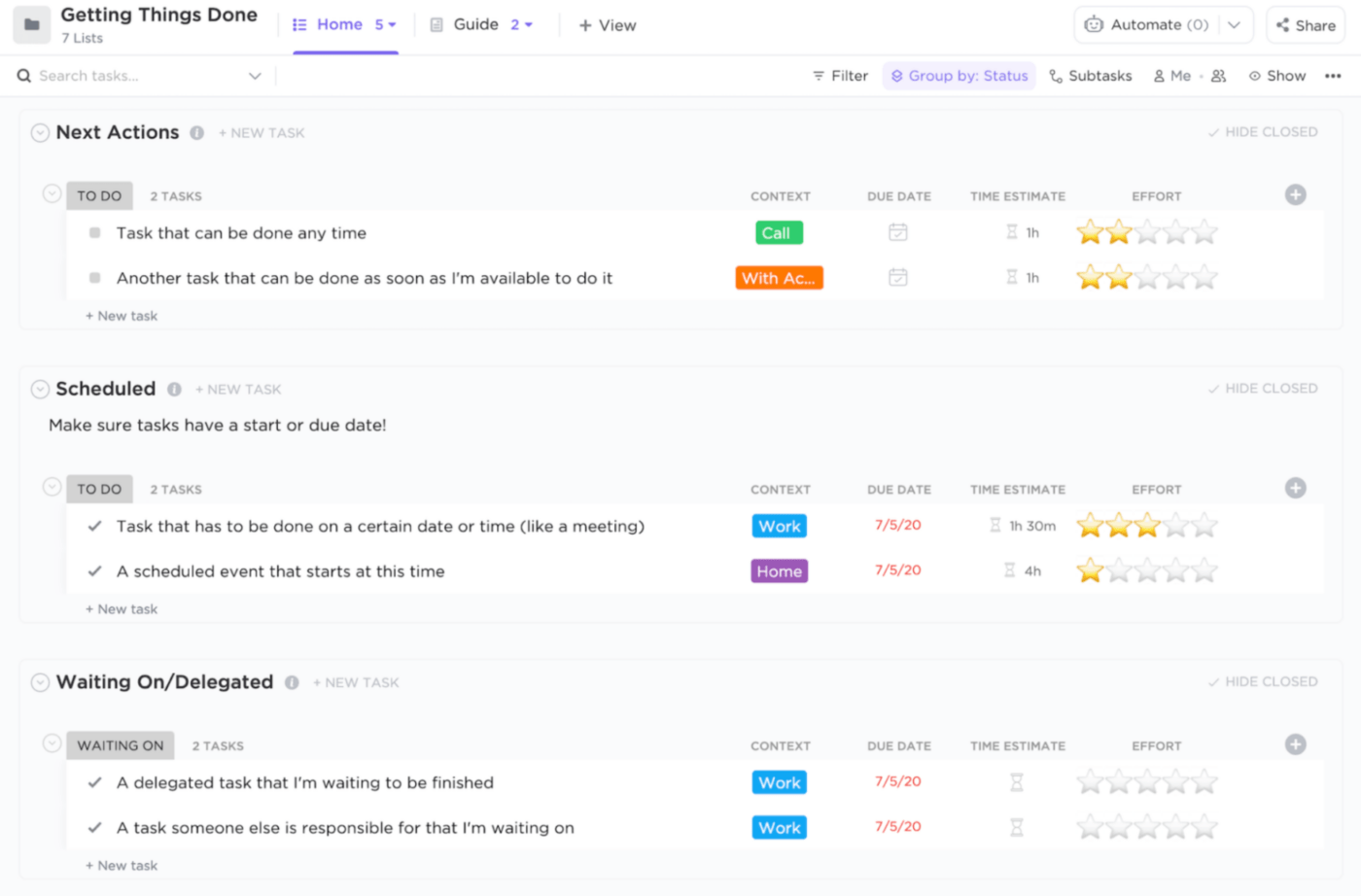
حافظ على تقدم الفريق إلى الأمام باستخدام طريقة GTD الموثوقة مع قالب إنجاز المهام من ClickUp. ليس ما تبحث عنه؟ اطلع على القائمة الكاملة لقوالب GTD! ما هي مخرجات المشروع التي لديك في الانتظار، أو الجاهزة للتنفيذ، أو المجدولة، أو المفوضة؟ ال قالب ClickUp لإنجاز المهام (GTD) الذي يستند إلى نظام ديفيد ألين (GTD)، والذي يتيح لك تنظيم جميع مشاريعك ومهامك من خلال تسجيلها وتقسيمها إلى عناصر عمل قابلة للتنفيذ.
هذا القالب يجعل من السهل عليك:
- استخدام حقول مخصصة مبنية مسبقًا لتنظيم المهام
- تحديد أولويات المهام حسب تاريخ الاستحقاق والجهد والميزانية والوقت والمزيد
- توفير الوصول إلى المستندات التعاونية لفريقك بأكمله تنزيل هذا النموذج ### 3. قالب مصفوفة جهد التأثير ClickUp
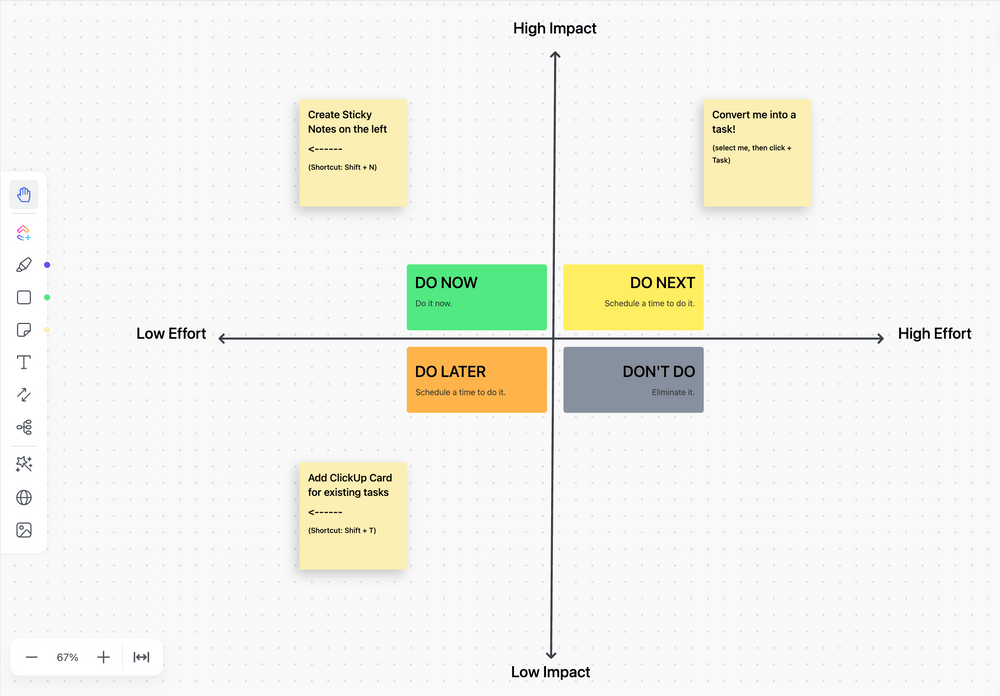
يتيح لك استخدام مصفوفة الجهد المؤثر إنشاء تمثيل مرئي للجهد المطلوب لكل ميزة حتى تتمكن من تحسين تحديد أولويات المهام والموارد
تعاون عبر الفرق وتأكد من المواءمة قبل بدء المشروع من خلال النظر في قيمة المهمة والمخاطر في نموذج قائمة ClickUp هذا. إن قالب مصفوفة جهود ClickUp التأثيرية يعمل كقائمة مرئية لإظهار مستوى "الاختصاص" للمضي قدمًا في النشاط قبل أن تتمكن من إكمال المشروع.
تسمح طريقة عرض قائمة ClickUp للفرق بالتعاون من خلال إنشاء حقول مخصصة وإعدادات تحديد الأولويات لتبسيط سير العمل بغض النظر عما إذا كنت تتعامل مع مخرجات خارجية أو داخلية. تنزيل هذا القالب
4. قالب ميثاق مشروع ClickUp
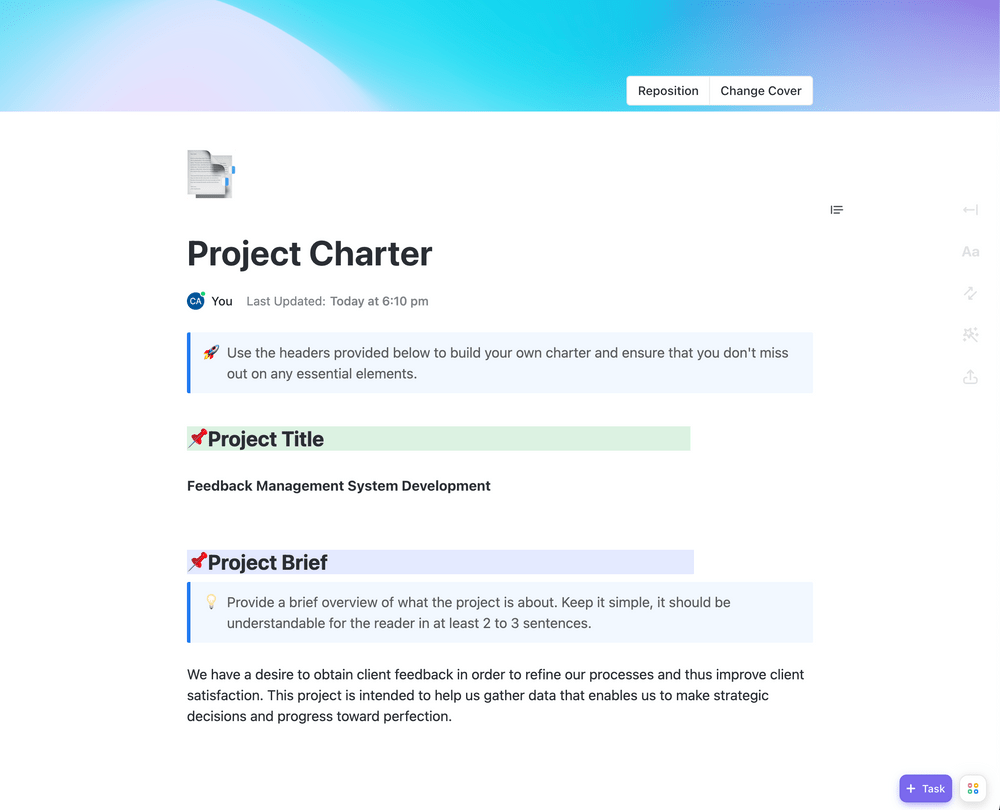
توثيق وتفويض المشروع بأكمله من البداية وحتى الإغلاق نموذج ميثاق مشروع ClickUp الخاص ب ClickUp هو الحل البسيط لتوثيق كل ما تحتاجه لمشروعك من البداية إلى النهاية. في مستند ClickUp هذا، يمكنك بسهولة إدارة نطاق المشروع مع القدرة على:
- تعيين التعليقات في المستند لأصحاب المصلحة الداخليين
- العمل معاً على نفس المستند بالضبط في نفس الوقت
- توفير وصول رابط خاص أو عام لأصحاب المصلحة الخارجيين تنزيل هذا النموذج ### 5. قالب ClickUp PMO Teams
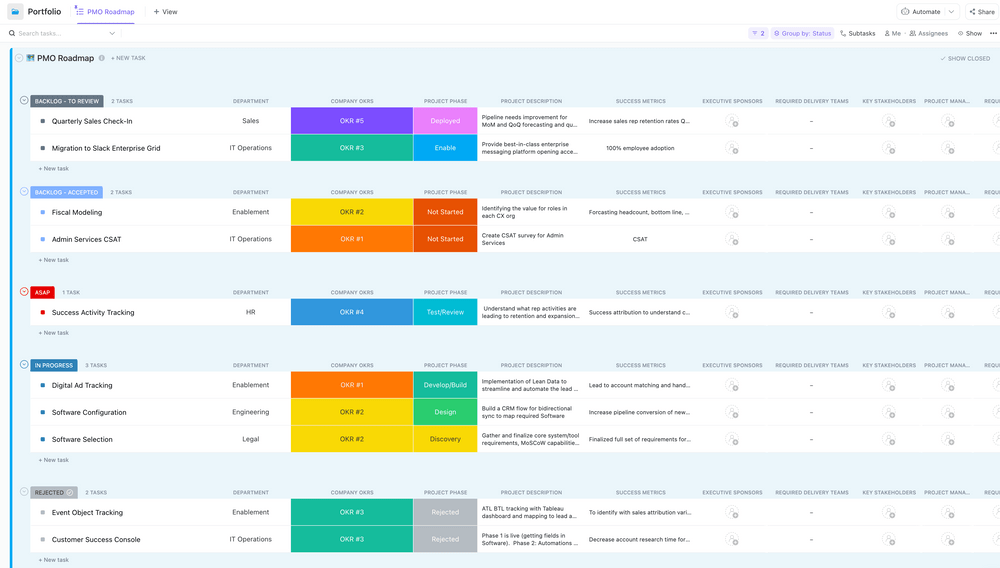
يعمل قالب فريق ClickUp PMO على تبسيط إدارة مشروعك, إدارة البرامج ، واحتياجات إدارة المحافظ من خلال كسر الحواجز وتمكين التنفيذ السريع
هل تبحث عن مقدمة بسيطة لإدارة المشاريع ضمن إدارة المهام النظام الأساسي؟ استخدم قالب فريق مكتب إدارة المشاريع في ClickUp لرؤية مهامك على مراحل مع تواريخ الاستحقاق، ومستويات الأولوية، والفرق المعينة والمساهمين، و ميزانية المشروع .
باستخدام هذا النموذج، يمكنك التحرك بسرعة من خلال عملية إدارة المشروع الخاص بك مع:
- عرض سريع للمهام الفرعية
- تعيينات متعددة للمهام الفرعية
- عرض كامل لـمراحل المشروع (قابل للتخصيص حسب احتياجاتك)
- ميزات السحب والإفلات البسيطة لضبط وتخطيط المهام تنزيل هذا القالب ### 6. قالب عبء عمل الموظف ClickUp

عرض عبء العمل الرئيسي وخصائصه باستخدام قالب عبء عمل الموظف من ClickUp
إذا كنت ترغب في تسريع عملية تتبع أعباء عمل الموظفين, نموذج عبء العمل الخاص بالموظفين في ClickUp هو نقطة البداية المثالية. سيساعدك هذا القالب على إضافة أعضاء الفريق، أو تعيين المشاريع، أو إضافة تقديرات الوقت، أو استخدام حجم المهام، أو التتبع حسب نقاط العدو السريع لمعرفة من يعمل على ماذا.
تسمح ميزات إدارة عبء العمل لدينا للعملاء المحتملين بما يلي إدارة الفريق الموارد وأعباء العمل حتى تتمكن بسهولة من تخطيط المشاريع الجديدة وتخصيص المهام أو المشاريع بناءً على قدرة الفريق. والآن، سيكون لديك نظرة شاملة على المساهمين الفرديين لديك حتى تعرف مقدار العمل المخصص بالفعل. تحميل هذا القالب
7. انقر فوق تفاصيل العمل قالب السبورة
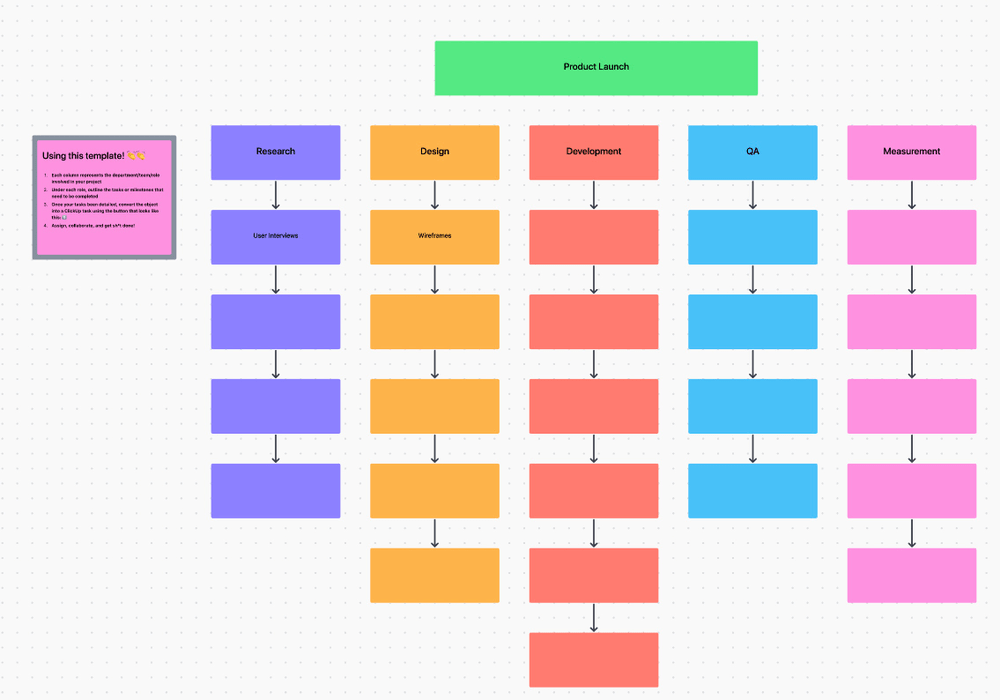
قم بتقسيم نطاق المشروع إلى مخرجات صغيرة، وتتبع المخرجات بسهولة لكل مرحلة، ومرحلة من مراحل الفريق المشارك في ClickUp Whiteboards
احصل على الصورة الكبيرة مع هذا ClickUp Whiteboard للتأكد من أن كل شيء يمكن أن يتحرك بسرعة. باستخدام هذا قالب تقسيم العمل الخاص بـ ClickUp يساعدك على تتبع المخرجات الخارجية أو الداخلية لكل مرحلة ومرحلة من مراحل الفريق المشارك.
واحدة من أفضل الخطوات الأولية التي يمكنك اتخاذها لبناء مشروع أكبر في ClickUp هي تقسيم النطاق الكلي إلى مخرجات أصغر للمشروع.
مكافأة:_ WBS Softwareتنزيل هذا القالب
إدارة مخرجات المشروع بفعالية باستخدام ClickUp
ClickUp هو التطبيق الوحيد الذي يحل محلها جميعاً. يتم جمع المهام والمستندات والدردشة والمزيد معًا في تطبيق واحد برنامج إدارة المشاريع مع أكثر من 1,000 عملية تكامل حتى تتمكن من إدارة مخرجات المشروع بفعالية.
تخلق قدرة كل فريق على التعاون في نظام واحد شفافية لا مثيل لها في جميع أنحاء المؤسسة لتحقيق المزيد من تنفيذ المشروع بكفاءة أكبر . اسمح لفريقك بسرعة تحديد السعة , خطة المشاريع الشاملة بشكل أكثر دقة، وفي نهاية المطاف دفع مخرجات المشروع بدلاً من مجرد تتبعها.
لست بحاجة إلى العيش في خوف من التقارير المرحلية لعملائك. اختبر شعور إدارة نواتج المشروع بدلاً من أن تتولى هي إدارتك.
اختر من بين عدد لا يحصى من إدارة المشاريع القوالب في مكتبتنا وابدأ في استخدام ClickUp لإدارة مخرجات مشروعك اليوم!

